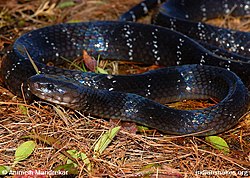Top Qs
Timeline
Chat
Perspective
Bungarus bungaroides
Species of snake From Wikipedia, the free encyclopedia
Remove ads
Bungarus bungaroides, the northeastern hill krait, is a venomous species of elapid snake.[2]
Remove ads
Description
This is a moderate- to large sized krait. Diagnostic characters:
- Dorsal scales in 15 longitudinal rows at midbody. Mid-dorsal scales are slightly enlarged anteriorly, but distinctly enlarged posteriorly.
- Subcaudal scutes ordinarily divided anteriorly, but occasionally some scutes may be single, but always divided near the tip
- Ventrals 220–237; subcaudals 44-51
- Dorsum – smooth, black with a series of very narrow white to pale yellowish lines or crossbars; on the belly, the light crossbars widen to form distinct transverse bars
- head slightly distinct from the neck. Top of the head is flat. Snout is blunt.
- Total length of largest male 1400 mm (55 in); tail length 160 mm (6.3 in)
Remove ads
Distribution and habitat
This species is found in Myanmar, India (Assam, Cachar, Sikkim), Nepal, and Vietnam at elevations around 2040 m as well as in Tibet. The type locality is given as: "Cherra Punjee, Khasi Hills, Meghalaya, India".[3][4]
References
Wikiwand - on
Seamless Wikipedia browsing. On steroids.
Remove ads



